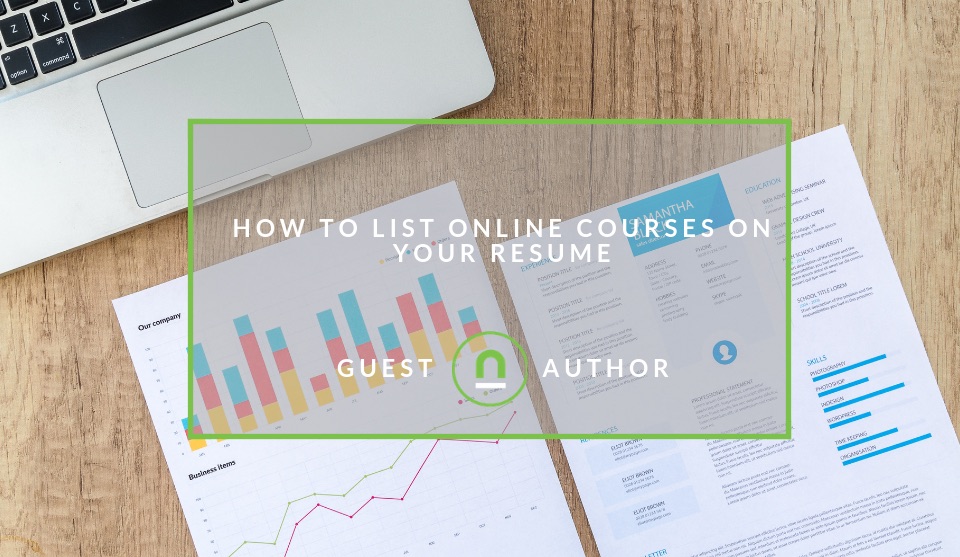Recent posts

nichemarket Advice
The South African VAT Threshold Chokehold
05 December 2025

Doctors Orders
The Difference Between SOAP Notes and DAP Notes
02 December 2025

Petrol heads
Why Load Bin Accessories Make Your Bakkie So Much Easier to Live With
26 November 2025

Alarming
What Is The Part Time Job WhatsApp Scam?
25 November 2025
Popular posts
Extravaganza
Trending Music Hashtags To Get Your Posts Noticed
24 August 2018
Geek Chic
How To Fix iPhone/iPad Only Charging In Certain Positions
05 July 2020
Extravaganza
Trending Wedding Hashtags To Get Your Posts Noticed
18 September 2018
Money Talks
How To Find Coupons & Vouchers Online In South Africa
28 March 2019
How to List Online Courses on Your Resume
22 May 2019 | 0 comments | Posted by Cathy Baylis in Talent Agents
A curriculum is the first point of contact with potential employers, so it’s crucial to make it just right. Remember that courses you’ve taken and certifications you’ve earned are the important parts of every professional resume. Each course gives your potential employer a better understanding of the person you are and it doesn't mean because the course is not an online MBA, that it does not matter.
Online courses, however, often represent a challenge for candidates and employers alike. If a candidate fails to showcase them appropriately, a board deciding on their skills and expertise might find the listed online courses irrelevant, and even unreliable.
Here is a step-by-step guide to help you list the online courses on your resume in a way that will attract all the right attention and help you get the job you are dreaming of.
Step 1: Choose trustworthy courses
Many business owners and HR managers perceive online courses as relevant sources of information and skills required for the personal and professional development of a candidate. However, in spite of that fact, you must be aware that some employers might still value online training less than any real-life course you might have taken. Take this information into account, and choose some of the courses provided by trustworthy, well-known sites such as Lynda, Coursera, Udemy, or Udacity. These names inspire trust and the feeling of security, so showcasing their courses in your resume can bring you only positive “points”.
Step 2: Showcase relevant courses only
Are you a person with many interests and hobbies, someone who is always on the lookout for the next thing you can learn? These traits can help you really stand out in an interview, but stop your hand before you end up listing all your online courses in your curriculum. Employers are fundamentally interested in skills and expertise you can bring to a position you’re applying for, so showcase only online certifications that are relevant for your application. Avoid listing any beginner and entry-level courses. If an opportunity presents itself, you can always talk about your rise from a beginner to a pro when your job interview gets set up.
Step 3: Give your certifications a section of their own
Online course certifications are the result of your hard work and dedication to studying and improving your knowledge outside of formal education. This is why they deserve their own section in your resume and you should never add these courses to the existing “Education” segment. Every section in your curriculum needs a catchy, polished headline, so avoid naming your courses section simply “(Online) Courses”. Options such as Professional Development, Certifications, or Professional Training will look a lot better on your resume.
Step 4: Elaborate on what you’ve learned
There’s nothing that makes your skills and certifications really pop like providing context that gives them “weight” and value. In practice, this means that you should never provide a mere list of courses and certifications. Take your time to plan and write what you’ve learned from each course, what you managed to implement in your professional journey so far, and which skills you plan to develop further.
Step 5: Size matters, as well as the placing
Last but not least, be careful which position in your resume you intend to leave for listing online courses, and how much space it will take up. As mentioned previously, online course certifications should have their own section, and it should ideally be placed somewhere between Work Experience and Formal Education. Courses represent the organic link between the two, as they connect your desire to learn with developing skills you can use in your work. As for the font size, make sure not to make it too small (missing the opportunity to give your certifications more value), nor to big (as your work experience should always be in focus in your curriculum).
Showcase your best assets
A professional, transparent, well-written resume can make it or break it when it comes to any job application. Showcasing your abilities and strengths should tell your future employers you’re a valuable expert who can contribute to the team, so make sure to create a CV that’s clean-cut, readable, and professional. Keep your curriculum regularly updated, and list your online courses according to the advice given above. Look for spelling errors, check grammar and punctuation, and your resume will be sure to leave a lasting impression.
About the author
Cathy Baylis is a freelancer at best essay writing service and a writer specializing in personal growth, career development, and leadership. She is also a part-time contributor for https://bestessayservicesreview.com/ and best essay writing service reviews. She loves sharing her interests with readers, and she has something to say, for sure.
Tell us your story
Would you like to write for nichemarket just like Cathy has? Find out how to submit a guest post and when you're ready, you can contact us.
Are you looking to promote your business?
South African businesses and freelancers can create your free business listing on nichemarket. The more information you provide about your business, the easier it will be for your customers to find you online.
Registering with nichemarket is easy; all you will need to do is head over to our sign up form and follow the instructions. If you require a more detailed guide on how to create your profile or your listing, then we highly recommend you check out the following articles.
Recommended reading
If you enjoyed this post and have time to spare why not check out these related posts and dive deeper down the rabbit hole that is job hunting.
- Facebook Tackles Job Postings To Rival LinkedIn
- All You Need To Know About The South African Minimum Wage Bill
- Digital Recruitment Agencies in Cape Town
- How To Find Local Freelance Work In South Africa
- How To Earn Cryptocurrency For Freelance Work & Micro Jobs
- 10 Amazing Jobs For Older People
- How To Prepare Your Career Path For Job Automation Disruption
- High Demand Jobs in South Africa For 2019
Tags: guest post , job advice
You might also like
Maximising Business and Trading Opportunities Through Smart Online Strategies
07 November 2025
Posted by Marcus Nord in Money Talks
This article aims to outline for entrepreneurs, SMEs, and individual traders how better outcomes might be achieved through well-designed online strat...
Read more48 Black Friday Software Deals 2025
14 November 2025
Posted by Che Kohler in Shopaholics
We put together a comprehensive list of software and digital business offering Black Friday discounts on their subscriptions or digital products this...
Read more{{comment.sUserName}}
{{comment.iDayLastEdit}} day ago
{{comment.iDayLastEdit}} days ago
 {{blogcategory.sCategoryName}}
{{blogcategory.sCategoryName}}


